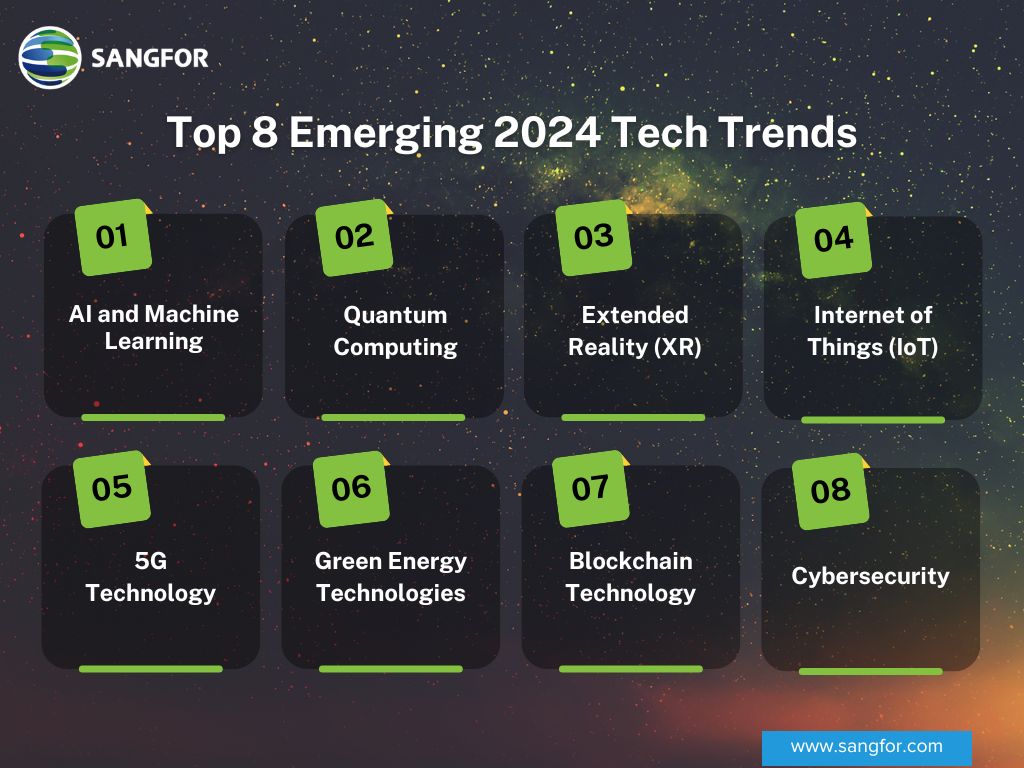As innovations emerge at an unprecedented pace, the ability to guide these developments responsibly and sustainably becomes essential. Effective governance plays a key role in steering innovation in today’s fast-evolving world of technology. In this article, we will navigate through 2024 tech trends, and explore how to strategically embrace governance to mitigate risks associated with these technologies and maximize their potential benefits. We’ll also take a look at the intricate relationship between groundbreaking technological advancements and the necessary regulatory frameworks that support their ethical and effective implementation. We focus on the most significant governance trends in technology that reshape sectors like cybersecurity, cloud services, and IT infrastructure.
Top 8 Emerging 2024 Tech Trends

1. Artificial Intelligence and Machine Learning
Artificial Intelligence (AI) and Machine Learning (ML) remain at the forefront of technological innovation, revolutionizing how industries operate and deliver services. In 2024, these technologies are increasingly being leveraged to create sophisticated AI-generated content. This enhances the capabilities of various applications from automated customer service to personalized content curation. Moreover, the introduction of generative AI models like GPT-4 has significantly advanced the field of Natural Language Processing (NLP). These models offer exceptional levels of understanding and generation capabilities, promising to further bridge the gap between human and machine communication.
AI in cybersecurity automates threat detection and responses by analyzing extensive data to identify anomalies, predict risks, and deploy immediate defenses against increasingly complex cyber-attacks. Leveraging machine learning, AI-driven systems enhance accuracy and speed in recognizing and countering security threats beyond traditional methods. Additionally, robust encryption protocols are crucial in maintaining data integrity and confidentiality against unauthorized access.
The rise in AI capabilities also brings significant challenges, particularly in managing the spread of misinformation. To address this, there is a heightened focus on developing more advanced detection algorithms that can effectively differentiate between genuine and false information.
2. Quantum Computing
Quantum computing is poised to redefine the potential of computational power in 2024. With major tech entities such as IBM, Google, and Rigetti leading the way, significant advancements in quantum hardware and algorithms are being realized. These deliver accelerated performance and provide exponential speed improvements for handling complex datasets, revolutionizing fields such as cryptography, optimization, and pharmaceuticals.
In cryptography, quantum computing offers the potential to create unbreakable encryption, while in pharmaceuticals, it accelerates drug discovery by efficiently simulating molecular interactions at remarkable speeds. Despite these advancements, the technology is still in its nascent stages, with practical, widespread applications just beginning to emerge. Companies are continuously exploring new quantum algorithms that could soon transform how we solve the world's most complex problems.
3. Extended Reality (XR)
Extended Reality (XR) encompasses Virtual Reality (VR), Augmented Reality (AR), and Mixed Reality (MR). In 2024, XR technologies continue to advance, offering more immersive experiences across various sectors.
For instance, in gaming, XR provides players with lifelike environments that enhance engagement and interaction. In professional settings, XR is revolutionizing training simulations that allow realistic and safe environments for training purposes, ranging from medical procedures to complex machinery operations.
Furthermore, XR facilitates remote collaboration and design visualization, particularly beneficial in fields such as architecture and engineering, where precise, three-dimensional understanding of spatial designs is crucial. As hardware becomes more sophisticated and accessible, the adoption of XR in both consumer and enterprise markets is expected to increase, which broadens the scope of its applications.

4. Internet of Things (IoT)
The Internet of Things (IoT) continues to expand significantly as more devices become interconnected, collecting and exchanging data. In 2024, the proliferation of IoT devices spans from smart home systems to wearable health monitors and industrial sensors, which gather vast amounts of data.
This data is increasingly processed via Edge Computing, which facilitates faster, local decision-making and reduces latency, enhancing operational efficiency. AI-driven analytics play a crucial role in interpreting this data, enabling predictive maintenance, enhanced user experiences, and optimized energy use across various applications.
However, with the growth of IoT, security poses a major challenge, as the increase in connected devices creates more potential points of vulnerability. Addressing these security concerns is critical to ensure the safe and reliable expansion of IoT technologies.
5. 5G Technology
The deployment of 5G technology continues to expand across the globe, signaling a new era of ultra-fast internet speeds, lower latency, and enhanced connectivity for a multitude of devices. This leap in network performance is enabling transformative changes across various sectors.
For example, in autonomous vehicles, 5G facilitates quicker data transmission, essential for real-time decision-making. In the healthcare sector, telemedicine is becoming more feasible and effective, with the ability to support high-quality, real-time video consultations and remote surgeries.
Additionally, smart cities are leveraging 5G to connect an extensive array of sensors and devices that allows for more efficient urban management and improved public services. As 5G networks become more ubiquitous, their potential to support emerging technologies and create new opportunities in connectivity will further redefine the technological landscape.
6. Green Energy Technologies
As 2024 sees the rapid evolution of green energy technologies, a significant focus is on their application in data centers, transforming how organizations manage energy consumption and enhance computing efficiency.

Innovations such as more efficient solar panels and wind turbines now offer sustainable and cost-effective power solutions. Additionally, advancements in energy storage technologies enable data centers to handle the intermittency of renewable sources and maintain reliable power supplies. The modernization of electrical grids supports the efficient use and distribution of this green energy.
Next-generation data centers integrate these technologies to minimize carbon emissions and reduce energy consumption while increasing computing capabilities. The adoption of electric vehicles (EVs) and improved battery technologies further support the energy needs of data centers and reduce the environmental impact of digital infrastructures. These developments are crucial in shifting towards a more sustainable and efficient technological ecosystem, showcasing how data centers can achieve more with less, using faster computing technologies. For further insights, consider exploring the role of green data centers in promoting environmental sustainability.
7. Blockchain Technology
Blockchain technology is extending its applications beyond cryptocurrencies, leveraging its core attributes of transparency, security, and decentralization for various uses. In supply chain management, blockchain offers an immutable ledger, perfect for tracking goods from production to delivery, which enhances transparency and reduces fraud. Secure voting systems based on blockchain can potentially increase electoral transparency and reduce the risk of tampering. In Decentralized Finance (DeFi), blockchain enables financial transactions and services without the need for traditional banking institutions, thereby increasing access and reducing costs.
Furthermore, Non-Fungible Tokens (NFTs) have surged in popularity, transforming the art and entertainment industries by offering a verified ownership method for digital assets. As blockchain technology continues to evolve, its potential to transform various sectors of the economy has become increasingly apparent.
8. Cybersecurity
As digitization progresses, cybersecurity becomes increasingly essential, particularly with the sophistication of modern cyber threats. The adoption of zero-trust architectures, which assume no entity is automatically trustworthy, reflects this urgency. This approach is vital in an environment where threats can come from both inside and outside the network.
While the potential dangers of AI are notable, its beneficial applications, particularly in cybersecurity, are significant. AI-driven cybersecurity solutions, now more common, leverage advanced technologies to enhance performance and protect digital infrastructures. It's also essential to stay informed and adaptable to anticipate and counteract evolving digital threats effectively. This proactive stance helps secure data and systems in our interconnected world, highlighting the transformative impact of AI in testing and strengthening cybersecurity boundaries.

Governance Strategies for Navigating 2024 Tech Trends
As tech trends in 2024 rapidly evolve, the principles of robust governance - transparency, accountability, compliance, and security - become crucial. These elements form the backbone of a strategic approach to technology management, helping organizations navigate the complexities of emerging technologies. By adhering to these principles, businesses can ensure that their technological advancements contribute positively to both economic and social development.
- For AI and ML, this means establishing frameworks to oversee ethical practices and misinformation management.
- Similarly, in Quantum Computing, governance protocols are essential to ensure ethical and secure usage, particularly in sensitive areas like cryptography.
- Extended Reality requires updated governance to protect user privacy and ensure ethical development.
- The IOT presents a major governance challenge in securing several connected devices and managing data responsibly.
- With the deployment of 5G technology, governance must focus on managing increased connectivity and data access, safeguarding privacy and security.
- For Green Energy Technologies, governance ensures that advancements contribute positively to sustainability goals and integrate ethically into public infrastructure.
- Blockchain’s expansion into diverse sectors necessitates transparent and secure governance to uphold its core attributes of transparency and decentralization.
- Lastly, effective governance in Cybersecurity is critical to manage evolving threats and integrate advanced AI solutions responsibly.
Together, these governance strategies ensure that technological advancements are leveraged responsibly and sustainably, aligning with both business ethics and social progress, and providing a competitive edge. IT teams must prioritize governance to navigate key 2024 tech trends as mentioned above. This strategic focus positions organizations to mitigate risks and achieve business success.
Addressing Tech Challenges with Effective Governance in APAC & EMEA
Cybersecurity threats
As cybersecurity threats become more sophisticated in 2024, IT governance is becoming increasingly essential. The APAC region has witnessed a sharp rise in cyber incidents, with the average costs of ransomware attacks and financial losses per incident growing significantly. According to a PWC survey, 84% of business and tech executives in the APAC region reported an increase in their cybersecurity budgets. Security spending in Asia Pacific is expected to reach US$52 billion by 2027, as companies face increasing cyber threats.
To counter these risks, IT governance incorporates a layered approach focused on risk identification, impact assessment, and mitigation strategies, supplemented by comprehensive employee training to strengthen awareness and compliance. The rise of cyber threats is compounded by vulnerabilities through third-party vendors. This necessitates stringent governance policies for selecting cloud service providers and establishing cybersecurity standards to safeguard data and ensure compliance, especially when integrating third-party services.
Cloud adoption & migration
Cloud adoption in the EMEA and APAC regions is also intensifying in 2024. According to a Forrester report, tech spending in APAC is set to remain strong, growing by 6.4% in 2024. This surge highlights the importance of robust IT governance to ensure that cloud adoption aligns with organizational goals, emphasizing scalability, cost-effectiveness, and compliance with essential security standards.
Effective governance facilitates successful cloud migrations by coordinating the allocation of resources, managing change processes, and conducting thorough testing phases. These tests assess performance, compatibility, and security - key factors for ensuring functionality and security integrity.
Changing work models
As remote & hybrid work models evolve, IT governance plays a pivotal role in shaping strategic business approaches. It is fundamental in establishing the necessary technological infrastructure for remote work, including VPNs and secure system access.
Additionally, effective governance involves developing clear security protocols and remote work policies to address technology trends in 2024, including data handling and incident reporting. This ensures the prioritization of security and data privacy and also supports the smooth integration of remote work practices into business strategies.
The Way Ahead
Strategic governance is a must in this era marked by rapid technological change. The foresight to effectively manage emerging technology trends ensures that their deployment maximizes benefits while minimizing risks. IT governance transcends its traditional role as a regulatory mechanism, emerging as a critical strategic driver for organizations.
Considering 2024 tech trends, a strong IT governance framework will be pivotal in empowering IT teams and managers to tackle new challenges effectively. This strategic approach ensures that organizations remain competitive and well-positioned for success in the rapidly changing technological landscape.
Strengthening Cybersecurity, Infrastructure and Governance with Sangfor Technologies
Sangfor Technologies, a leading global IT vendor, excels in delivering AI-powered cybersecurity, cloud computing & infrastructure solutions.
Sangfor Zero Trust Guard is an easy-to-use, cloud-based Zero Trust Network Access (ZTNA) solution that provides high-performance, secure, and reliable remote access to any application or resource, whether on-premises or in the cloud. Through its cloud-native architecture, simplified policy management, and AI-driven malware detection, Sangfor ZTG scales effortlessly with business growth, ensures unified policy enforcement, and stops advanced cyber threats without compromising performance.
Sangfor's expertise not only drives technological progress but also ensures robust governance, maintaining the integrity and security of IT ecosystems. This dual commitment equips Sangfor’s clients to excel in a digital world, supported by secure, efficient, and advanced technologies. To learn more about Sangfor's cybersecurity and cloud computing offerings, please visit www.sangfor.com.





